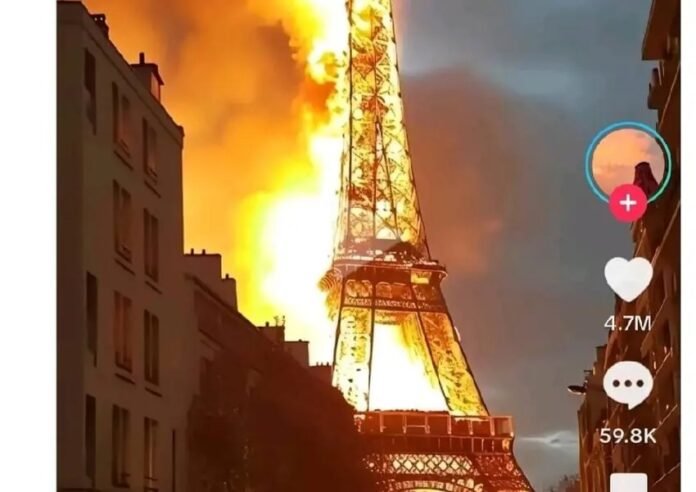
Paris, January 25, 2024 – In a bizarre turn of events, an alarming video depicting the iconic Eiffel Tower engulfed in flames went viral on TikTok last week, leaving millions in shock and prompting an outpouring of concern on social media.
The fabricated footage, generated by artificial intelligence, has garnered 4.7 million likes and widespread shares, with a significant number of viewers apparently falling for the ruse.
While many users quickly discerned the video’s artificial nature, a troubling number remained convinced of its authenticity.
The hashtag ‘pray for Paris’ began trending on various platforms as people expressed their distress over what they believed to be a genuine crisis.
A search on TikTok for ‘Eiffel Tower‘ currently brings up distressing variations like ‘Eiffel Tower on fire’ and ‘Eiffel Tower 2024 fire’ as the top results, further perpetuating the misinformation.
The ease with which such content spreads highlights the challenges platforms face in curbing the dissemination of false information.
The Parisian authorities quickly addressed the situation and reassured the public that the Eiffel Tower was not in flames. As of Wednesday, the iconic landmark stood tall and welcomed tourists unaffected by the fabricated firestorm.
In fact, the Eiffel Tower retained its status as the most-visited tourist spot in Paris throughout 2023, attracting a staggering 6.3 million visitors.
The incident raises concerns about the potential consequences of misinformation in the age of digital media.
The rapid dissemination of fake news, particularly in the form of compelling videos, seriously threatens public perception and can even lead to unnecessary panic.
In response to the video, authorities are urging social media users to exercise caution and verify the authenticity of content before sharing.
The incident also prompts a reevaluation of the algorithms that determine search results on platforms like TikTok, as the ease with which the fake fire video surfaced raises questions about the responsibility of tech companies in preventing the spread of misinformation.
The creators of the AI-generated video remain unknown, but the incident has reignited discussions about the ethical use of artificial intelligence.
As technology continues to advance, the potential for such deepfake content to cause confusion and panic becomes a pressing concern for society at large.
In conclusion, while the Eiffel Tower remains unscathed by the virtual flames, the incident serves as a stark reminder of the power of misinformation in the digital age.
As authorities work to dispel the rumours and restore calm, the event underscores the need for increased vigilance and critical thinking in the face of sensational content circulating on social media platforms.
This article was created using automation technology and was thoroughly edited and fact-checked by one of our editorial staff members